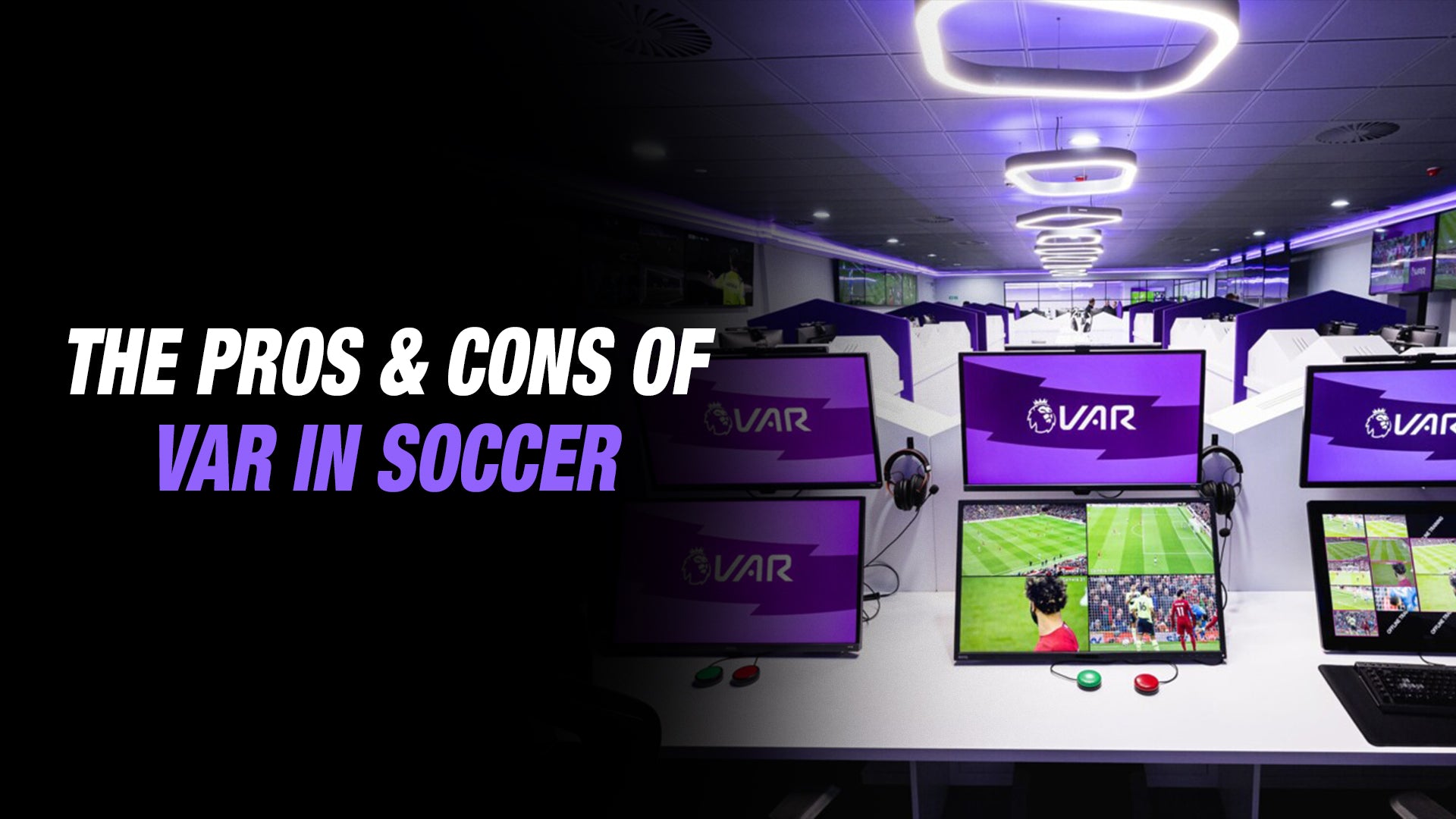The Pros & Cons of VAR in Soccer

One of the most controversial discussions in the world of soccer is surrounding Video Assistant Referee (VAR) technology. VAR is a new virtual referee system that’s used in soccer to assist on-field referees in making critical decisions during matches. It involves a team of video assistants behind the scenes whose sole purpose is to review footage from multiple camera angles to ensure the correct call is being made by the on-field referee. Various situations including goals, penalties, and red card situations are crucial to the outcome of a match, so this method was created to ensure accuracy and fairness (in theory).
Unfortunately, since the implementation of VAR there’s been intense debate between supporters and critics involving whether or not the new technology has impacted the game in a positive or negative way. Supporters have chosen to stand by VAR and view it as a vital tool going forward. Critics, however, have considered some flaws with the new tech that have created complications and caused disruption in recent matches. Let’s explore the pros and cons of Virtual Assistant Referee technology in soccer and the impact it has on the sport as a whole!
Pros of VAR in Soccer
- Better Decision Making
One advantage of Video Assistant Referee technology is the improved decision-making capabilities that come from having a whole team of people contributing to a decision versus one referee. Before VAR it wasn’t possible for a referee to overturn a decision following an incident; however with VAR, if that decision was deemed incorrect it can be changed. This ability to revise a previous action in order to make the final decision can be crucial for the development of the game and ensuring the right teams make it through.
- Greater Entertainment
Another advantage of VAR in soccer is the increase in excitement when watching a game. Fans have very high expectations when watching matches – above all, they want to be entertained. VAR increases the excitement as it introduces more dramatic experiences when a referee is watching a replay to make their decision. This is more intense when the action getting revised involves a goal or a possible penalty kick. Many fans have stated that the suspense of waiting for a decision from the VAR officials can often be just as thrilling as watching the match itself!
- Enhanced Fairness
One thing VAR has been praised for since its implementation is its promotion of fairness and unbiasedness on the field. It helps prevent controversial decisions that could potentially change the outcome of a game. This increased transparency and accountability contribute to a more level playing field for all teams. Fans can relax knowing that the final decision was an educated one and difficult decisions are not taken lightly.
- Greater Player Discipline
Another pro when it comes to VAR is the enhanced scrutiny of players has led to greater discipline on the field. There’s been a drastic improvement in diving, less instances of players arguing with referees, and fewer players getting away with violence on the field that was missed by the on-field referee. Overall, soccer is a sport that requires discipline and VAR may be the vital tool we need to enforce it and promote fair play between players from both teams.
- Less Controversy
Lastly, another way VAR can impact soccer in a positive way is by reducing the number of debates and disputes after matches, particularly following a high-stakes game. By allowing for video reviews using multiple camera angles, VAR gives viewers an unbiased look at critical incidents and can therefore reduce disputes over decisions made by the referee.
Cons of VAR in Soccer
- Disrupts the Game
One disadvantage of Video Assistant Referee technology in soccer is how it can disrupt the flow of the game. Time, for example, is crucial when it comes to soccer matches. If a team is feeling the pressure to win a game or get back the upper hand, then anything that takes away from that focus can be detrimental to their success and can negatively affect the outcome of a game. VAR decisions involve close and careful analysis that can take several minutes and, as a result, delay games. This can be very annoying for fans and players who want to be in the moment and know immediately if they should be celebrating a win or dealing with a loss.
- Decision-Making Errors
Another downside to utilizing VAR in soccer matches is the possibility of decision-making errors. Although VAR helps referees be more accurate with their decisions, the technology is still reliant on human interpretation, which can lead to inconsistencies and how similar situations are judged. Regardless of how fair a final VAR decision may seem, it’s not a perfect tool and can still make mistakes.
- Dehumanizes the Game
Another con to consider surrounding VAR in soccer is how it can dehumanize a game that’s widely praised for its unpredictability. Fans of the beautiful game admire how a match that’s seemingly going one way can change in a matter of seconds. Soccer has proved time and time again that anything is possible and to expect the unexpected. Part of this feeling comes from the unpredictability of human error, whether it’s a mistake made by a player, coach, or referee. VAR leaves very little room for human error and takes away from the human element of the game, as a result.
- Lack of Transparency
Another huge concern of VAR with critics is the lack of transparency after a controversial decision has been made. During reviews, the details of the decision-making process are often not communicated to fans or players in real-time. This can leave everyone confused about the rationale behind an unexpected decision. Fans also don’t have access to the same camera angles and replays that the VAR team uses, so this lack of clear communication can spark debate among viewers.
- Reliant on Technology
Referees are just like anyone else when it comes to becoming reliant on new technologies and VAR is no exception. A referee's individual decisions are important in soccer as these are fast, straight to the point, and based on their years of training. However, since the introduction of VAR, referees are relying more on this tool instead of their own skills and expertise. Critics argue that Video Assistant Referee technology is used too frequently and should only be necessary when certain action is confusing for the main and the assistant referees.
Now that you have a better understanding of both sides when it comes to the pros and cons of Video Assistant Referee technology, would you consider yourself a critic or a supporter? Despite having its disadvantages, it’s clear that VAR has been a helpful tool in leagues and tournaments around the world and we don’t see it disappearing from our match experience anytime soon!
- Tags: LIFESTYLE
0 comments













